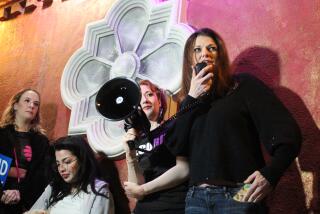Cable TV Firm, Gay Dancers Argue Over Tape
- Share via
The video begins with music--a Southern-fried tune plucked on twangy banjo--as the camera pans across a group of about 20 men, some of whom are bearded and dressed in frilly women’s skirts, dancing arm in arm to the cadence of a fast-talking announcer.
They are square-dancers, who--despite their wide smiles on the video--say they are victims of discrimination by a Ventura cable television company that will not allow the tape on its public-access channel.
“We thought it would be a wonderful way to spotlight the gay community in a positive way,” said Paul Waters, organizer of the Simi Valley-based dance group known as the See-Me Squares, which joined the Los Angeles-based Tinseltown Squares to produce the tape. “But it looks like some other people didn’t feel the same way.”
Although Waters and others in the group contend Ventura’s Avenue Cable rejected the tape as obscene, officials from the cable company say the dancers only need to pay a $40 fee to broadcast the tape on the public-access channel. The charge is required because the tape--which solicits new members--qualifies as advertising, they say.
But group members say that the company officials are misrepresenting what happened--and that in any case, they shouldn’t have to pay any fee because their group is nonprofit.
The dispute began late last year after John Ryan, a Ventura resident and member of the See-Me Squares, approached Avenue Cable with a copy of the tape. He said the tape was returned later with a notice that the cable company would not show it.
Ryan said station manager John Robinson told him at a later meeting that the program contained obscene material, and that he highlighted a portion of a public-access agreement sponsors must sign that prohibits obscene material.
The highlighted portion tells anyone offering tapes for the public-access channel that Avenue Cable may refuse to show a program that “we reasonably believe describes or depicts sexual or excretory activities or organs in a patently offensive manner as measured by contemporary community standards.”
“That was surprising because other stations in Los Angeles had already aired it, and several local ones had agreed to show it,” Ryan said.
Robinson, however, has steadfastly denied that concerns about obscenity were involved.
“The reason it didn’t play was because they didn’t want to pay,” he said. “I never thought the program was obscene or even mentioned the word . . . What they’re saying is an absolute lie.”
Robinson said that Avenue Cable’s policy excludes from free public access any program that advertises in any manner. Sponsors of such programs--for-profit and nonprofit groups alike, with the exception only of government agencies--must pay $40.
He said the video qualifies as advertising because it displays a phone number for viewers to dial to learn more about the dance groups.
But Jonathan Wright, a member of both groups who also met with Robinson, said that because the groups are nonprofit, they should have been allowed to show the program free of charge. And as a matter of principle, they decline to pay.
Despite the dispute, other cable companies, including Comcast Cablevision of Simi Valley, TCI Cable of Ventura County and Jones Intercable of Oxnard, have had no objections to the show.
“There was never even a question about it, so the program was never an issue for us,” said Jones Intercable’s general manager, Steve Naber. “It’s not our channel, it’s the public’s, and when you start making determinations based on content, then you’re running into 1st Amendment issues.”
Peter Scovill, access coordinator for TCI Cable, said that the station uses very limited criteria when screening potential programming.
TCI’s policy prohibits public-access programming that includes advertisements, lotteries and programs that contain grossly obscene material, such as exposed genitalia and simulated sex acts.
“The content of the tape did not contain anything that we would have considered obscene or as being an advertisement,” he said. “By our standards, this was fine.”
If Avenue Cable refused to show the program because it deemed it obscene, as some of the square-dancers have alleged, the station may have entered a problematic legal area, said Doug Mirell, a constitutional law attorney and board member of the American Civil Liberties Union of Los Angeles.
“If they denied the program because they saw it as obscene, then those reasons do not fall under the Supreme Court’s definition of obscenity,” he said. In the past several years the Supreme Court has ruled in favor of program producers whose shows have been yanked by station officials who considered them obscene.
The square-dancers said that they do not intend to file suit against Avenue Cable, but they said that the damage has been done and that they know what Avenue Cable’s real motive was--a view Robinson rejects.
“I believe that what I did was proper,” he said. “If they would have returned the contract and paid, we would have aired it in the first place.”
(BEGIN TEXT OF INFOBOX / INFOGRAPHIC)
FYI
The See-Me Squares video will be shown on public-access channels around Ventura County as follows:
* TCI of Ventura County, Channel 8: 8 p.m. Friday, and March 20 and 27. The company serves unincorporated areas and parts of Thousand Oaks, Moorpark, Camarillo, Santa Paula, Fillmore and Piru.
* Jones Intercable of Oxnard, Channel 19: 9:30 p.m. today. The company serves Oxnard and Port Hueneme.
More to Read
Sign up for Essential California
The most important California stories and recommendations in your inbox every morning.
You may occasionally receive promotional content from the Los Angeles Times.













